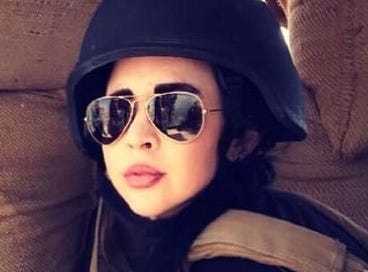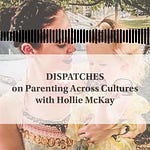OK. Here we go. Another dispatch, this time from Ukraine, with Hollie McKay. Hollie, where are you right now?
I'm currently in the capital of Ukraine, which is Kyiv.
Geez, well that's a little bit different from Kabul. How long have you been there?
I can't remember because I I've been in Albania for the past week before this. Then I came I guess a week ago.
This is right in the middle of a period where negotiations and diplomacy between the US and Russia are at a peak around the world. The world is watching. Last night, Vladimir Putin was in China with Xi Jinping at the Winter Olympics. Where have you been in Ukraine in the last week?
I've been in the capital. I also drove across the country all the way to the eastern part which is currently in a state of war. It's been at war for eight years. So, while we are hearing the media now about a big Russian buildup around the country, what a lot of people don't realize is that a section of the country that that borders Russia has been in a very brutal, intense conflict. With pro-Russian backed separatists, which if you ask Ukrainian people they usually say, well, that's just Russia.
Technically they are. They are separatists in those areas. It's a really brutal war. I was in a lot of those areas. Cities like Kramatorsk and Zhdanivka which have been occupied by these by these groups in the past, and are just outside of Donetsk, which is under the pro-Russian occupation.
For people that aren't familiar, this conflict erupted around the same time that the Russia annexed Crimea.
Yeah, so it all basically spawned in the beginning of 2014. There were some peaceful protests. They called it the Maiden Revolution, that was in the independent square here in Kyiv, and that was really a grassroots movement. They wanted to see President Victor Yanukovych ousted. It turned very violent in the end. So, as we see in many countries, what was a peaceful protest when police brutally started beating a lot of the protesters and that sort of ignited a quite a visceral response from the people, and he was actually ousted from government. That obviously upset President Putin quite a bit because he was basically a puppet to him.
From there, pretty much immediately is when we saw Putin annex Crimea and then just a couple of weeks later, even though they deny it, effectively they backed separatists to violently go into Ukrainian territory and take parts of the east.
So that's been going on for quite a while. Did you get an impression that it is more intense now or about the same as it's been for the last eight years and in the Separatist contested part of Ukraine?
It's been pretty steady for the past eight years. It’s my understanding not necessarily any more intense. Maybe a little bit less intense, certainly than it was, especially right at the beginning, so they really haven't seen any changes in those parts. For Ukrainians, it's a little bit perplexing as to why it suddenly getting attention now when it's really been something that has been going on a really long time.
That is a steady state war there. How is the rest of Ukraine as you step away from the separatist contested zone and back into the main part of the country and Kyiv?
You know Ukrainians aren't really, you know, they take all this pretty much in stride. They're not, you know, a lot of countries you go for you, you'd probably see a mass panic of people trying to leave, or trying to hold supplies, whatever it is, and there's certainly none of that I'm seeing at all in Ukraine.
Maybe things in Kyiv are a little bit more intense only because you know the capital isn't used to any kind of conflict. And there a lot of rumors percolating that that the Russian strategy would be to encircle the capital and force the demands upon the government; or to oust the government.
But I think in the east, even though it is in a state of war, you're just seeing business as usual because they have become accustomed to it, and they've learned to adapt their lives around what is happening, and so the sort of the threats and the talks and things that are happening now aren’t necessarily ruffling their feathers, so to speak.
But having said that, Ukrainians are certainly preparing should an invasion happen. You are seeing a lot of movements with civil defense; a lot of civilians doing training, a lot of people buying weapons. Ukrainians very much take this pride in what they call their “Second Amendment” movement, unofficially. They very much look to America, and the idea of the right to bear arms.
It's something that Ukrainians, especially after the revolution that happened that did turn violent, took that very seriously. So, with a lot of Ukrainians you'll meet, it's a sort of a very non-taboo subject to talk about the weapons that you own. Government officials, you know they'll go to the front lines, and they'll take their own Kalashnikov with them.
Ukrainians are determined to fight. That's not just from the military point of view, but civilians are not going to just run away as we see in a lot of other countries that I've worked in, frankly.
Well, that's interesting. So last question, given what you've seen in Ukraine, clearly what you're indicating here is that Ukrainian people are not of a mind to give up their sovereignty without a fight.
In the context of the global aspect of this, you've got many of the world countries all the way to the UN Security Council that the Russians have the presidency this month, the US is rallying as much of NATO as it can to say, “We need to counter on the West side what the Russians are doing on the east side in terms of positioning major pieces of military equipment.” How do you think this whole international play is affecting the Ukrainians? How much of how much of all this noise that's going on around them is really something that they're involved in? Or are they spectators too? Are outsiders playing with their country like a toy?
Of course, I can't speak for everybody, but Ukrainians are appreciative of the US and other NATO countries sending them weapons. They realize that they are a country of forty-four million as opposed to Russia, which is a country of 144 million so therefore their arsenal is much more extensive.
The Ukrainian military historically has been weak and up until 2014 it was barely in existence. When the situation in Crimea and Donbas happened, that really sparked the importance of building that military capacity; and honestly, at the beginning they were crowdfunding. People would receive a text message on their phone that said donate $0.70 a week to support the buildup of a Ukrainian military.
It's a very new military and while they have numbers and a lot of very tenacious fighters, they don't really have the experience necessarily, and certainly not the equipment to push back against a Moscow led military.
They're very set on wanting to receive as much support from Western countries as they can, and obviously that includes weapons; and it is important for them to have that backing. It's something that they see is their only hope because they know just how vastly outnumbered and potentially outgunned, they would be if a ground invasion was to happen.
Are you getting the impression from the people that you have been able to interact with in your interviews in Ukraine that type of assistance is forthcoming from the West?
Yeah, it absolutely is. I mean, a government official close to the president, said that they were receiving basically seven shipments a day of equipment; and they were very grateful for that.
But really, this is the situation where nobody really knows, I think, obviously what Putin is going to do; and that really is something that changes hour by hour, day by day, as to how he's going to play those cards.
If you'd asked me a couple of days ago, did I think an invasion would happen? I probably would have told you no. However, in the last 24 hours I have received interesting information from Kyiv, and from well-placed sources in DC that they are preparing for something to happen.
You know, within two to three weeks, basically that Moscow is demanding that the US makes concessions on either the Minsk Protocol, which was the 2014 ceasefire agreement in the Donbas Region; or they want guarantees that Ukraine will never enter NATO. And both of those are not concessions, to my understanding, that Washington is prepared to budge on, which really leaves the opportunity for Putin to have to take some form of action.
We aren't quite sure, obviously, what that action will be or and how much will that be cyber, how much will that be kinetic, or whether it’ll be ground, or whether it be from the air. But Mr. Putin certainly has many options. I think at this point, Ukrainians are expecting something to certainly happen within the month.
That's about as good an update on the ground as one could ask for. It is a very dynamic situation. With that, I will say thank you Hollie. You always do seem to wind up in those parts of the world that are most interesting to cover at any given point in time and. Keep doing your job.
Thank you, Dennis, I appreciate it.
For those interested in learning more about the aftermath of war, please pick up a copy of my latest book “Only Cry for the Living: Memos from Inside the ISIS Battlefield.”
Also if you want to support small business:
And also now available Down Under!
Thanks again for your support. Follow me on Instagram and Twitter for more updates














Share this post